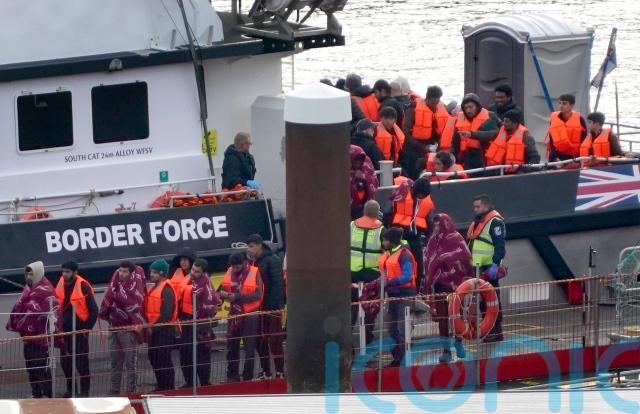
Housing children who are seeking asylum or are homeless in hotels can be dangerous and “exacerbate trauma”, a new report has warned.
Scotland’s Children’s Commissioner said youngsters must not be housed in unsuitable accommodation such as hotels, hostels, B&Bs, cruise ships or barges because it may violate their human rights.
The report said children in the asylum system have spent increasing amounts of time in hotels “as a direct consequence of a series of UK Government legislative and policy decisions which disregard human rights”.
While the UK Government has announced plans to cut the number of hotels used to house migrants, the report said many refugees and asylum seekers are being required to share rooms, or being moved into other similar forms of accommodation such as barges or camps.
One young person housed in a hotel said: “Sometimes I feel like I am in prison. I do not know anywhere around me, sometimes I take a walk to ease the tension as there are no other young people in the hotel that I can talk to.”
The report also noted more children experiencing homelessness are being housed in temporary hotel-type accommodation by local authorities due to a lack of suitable alternatives.
Titled Sometimes I Feel Like I Am In Prison – Placing Children In Hotel-type Accommodation, the report makes a range of recommendations to minimise and mitigate the harm it says such environments can cause.
Nicola Killean, the Children and Young People’s Commissioner Scotland, said: “Our starting point is always that no child should have to live in a hotel, or hotel-type accommodation – they are totally unsuitable and violate a wide range of children’s rights.
“Hotels are not a luxury option. They can be dangerous, exacerbate trauma and cause long-term harm to health and development.
“Our report recommendations are for public authorities and accommodation providers to follow to ensure that they comply with their human rights duties to children. The recommendations can also support front-line workers to advocate for children.
“Risk assessments and children’s rights impact assessments must be done when placing children as well as for all children currently in hotel-type accommodation to help minimise the negative impacts.
The child’s rights to safety, health, education, development and many more must be taken into account.
“Human rights are universal. They apply to all children without exception, whether a child is born here or moves here.”
The report said in the asylum and homeless systems, “children are experiencing significant periods in environments which can be actively dangerous, exacerbate trauma and cause long-term harm to health and development”.
It recommends that if a child does have to stay in a hotel, the accommodation must meet the necessary standards to provide them with an adequate standard of living, taking into account their rights to education, play, health, privacy, family life, safety and development.
One young person living in hotel accommodation questioned for the report said: “I did not have my own room; I did not see other children. I was very lonely and scared.”

Yvonne Blake, co-founder of Migrants Organising for Rights and Empowerment, said: “Hotel-style accommodation will always be wholly inappropriate, discriminatory, and unsuitable for children and young people.”
UK immigration minister Robert Jenrick last week announced that the number of hotels used to house migrants will be cut by 50 over the next three months and said the plans are possible because of “the progress we’ve made to stop the boats”.
The report incorporates analysis and conclusions from two expert research papers compiled on its behalf and also draws on lived experience from refugee and asylum seeker children, young people and their families.
Scottish housing minister Paul McLennan said: “Scotland has the strongest rights in the UK for people experiencing homelessness and – whilst it shows our legislation is working to make sure people are not roofless – temporary accommodation should be just that, temporary.
“We have committed to act on the recommendations of the expert Temporary Accommodation Task and Finish Group, including investing at least £60 million for councils and social landlords to acquire properties for use as affordable homes.
“The UK asylum system is failing those fleeing war and persecution, with people left in limbo because the UK Government’s mismanagement has left a backlog of over 175,000 people waiting for a decision on their cases. Inhumane asylum policies also restrict people’s rights and access to support while they wait for a decision.
“This has put acute pressure on housing and social work services supporting asylum seeking children, meaning hotels have been used by some local authorities on a temporary basis to accommodate young people aged over 16 while a suitable placement is found.”
The Scottish Government is working with the Home Office, councils and others to “find solutions and provide the safety and security young asylum seekers need to rebuild their lives”, Mr McLennan added.
A Home Office spokesperson said: “The Government is working to end the unacceptable use of hotels by moving asylum seekers into alternative, cheaper accommodation and clearing the legacy backlog.
“The health and welfare of asylum seekers, including that of children and families, remains the utmost priority.
“We work continually to ensure the needs and vulnerabilities of those residing in asylum accommodation are identified and considered, including those related to mental health and trauma.”
Subscribe or register today to discover more from DonegalLive.ie
Buy the e-paper of the Donegal Democrat, Donegal People's Press, Donegal Post and Inish Times here for instant access to Donegal's premier news titles.
Keep up with the latest news from Donegal with our daily newsletter featuring the most important stories of the day delivered to your inbox every evening at 5pm.